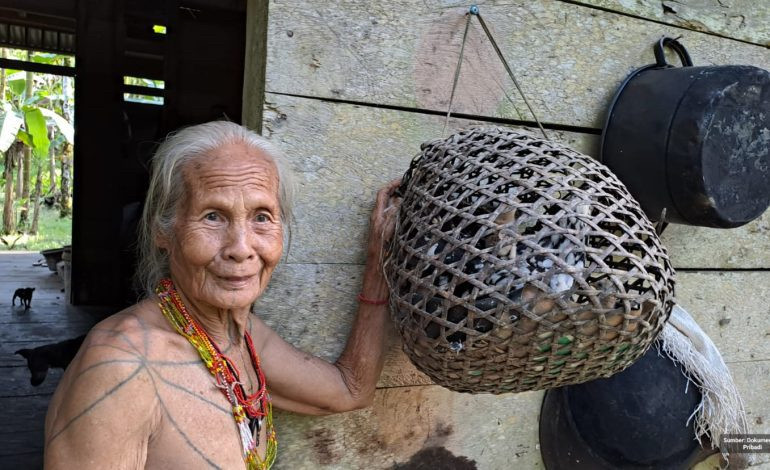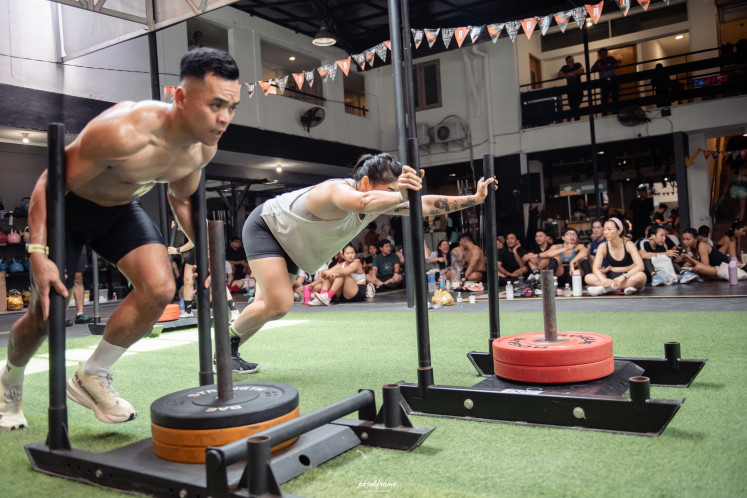Popular Reads
Top Results
Can't find what you're looking for?
View all search resultsPopular Reads
Top Results
Can't find what you're looking for?
View all search resultsNo land for Mentawai women (part 1)
Even though Mentawai women earn their living by cultivating land, they have no right to own it. This is the first of a two-part story, with part 2 to be published on Oct. 7.
Change text size
Gift Premium Articles
to Anyone
A
span style="font-size:12pt;font-family:'Times New Roman',serif;color:#000000;background-color:transparent;font-weight:400;font-style:normal;font-variant:normal;text-decoration:none;vertical-align:baseline;white-space:pre;white-space:pre-wrap;">A small hut stands alone in the middle of the forest. Gray smoke blows from its chimney. I visited the house and met its owner, Nanda Saleleubaja, an 85-year-old Mentawai woman with a small frame and tattoos, wearing a tudda (necklace).
She was resting after a long day working the land. By her side are six taro roots, lined up neatly on the floor.
She planned to keep half of the harvest for her own use. The rest, she would exchange for salt, sugar, chilies and other basic goods from other people of the Mentawai community. She maintains this barter system instead of selling the produce, because the price of taro is only Rp 5,000 for three roots.
Other than taro, the sangamata (plot of land) around Nanda's house is used to farm areca nuts, cacao and bananas. She harvests and processes everything herself. This small sangamata is Nanda's only source of income since her husband died 10 years ago. Without it, Nanda will not be able to feed herself, unless she asks her children for help.
Unfortunately, even though this land is her livelihood, Nanda does not own it.
“It belongs to my husband. When my husband died, his family sold most of the land. My dowry was also sold. I was only left a little to live on," Nanda said in the Mentawai language.
No land ownership
In the Mentawai community, only men can own land.
This not only affects Nanda, but also Sekar (not her real name). The 25-year-old woman heads a disabled family and also has no right to own land. She now lives with her mother and her only child, Melati (not her real name).
Sekar depends on the produce she grows on her farm to make a living. Every day from 7 a.m. to 7 p.m., she works her fields located 2 kilometers from her house in Srilanggai. There, Sekar cultivates and harvests peanuts, corn, chilies, taro and bananas.
The hands of Mentawai women touch everything in the Mentawai Islands.
The profits earned from each harvest is used to buy food and school supplies for Melati, who is still in elementary school.
Sekar, who only communicates nonverbally, said the land belonged to her father. Even when clearing the land, she needed to obtain permission from her parents, especially her father, because men were in charge of the land.
“I’m just a ‘worker’. This land belongs to my father. So wherever my parents farm, I can only follow them,” she said.
Without any right to own land, Sekar’s life is vulnerable. Moreover, just like Nanda, farming is the only way she has to earn money. If one day her parents decide to separate, Sekar and Melati’s lives will be at risk.
It doesn’t help that Sekar is disabled. Her neighbors, including neighborhood children, often steal her crops and damage her land. When she confronts them, she is ridiculed. In the end, Sekar could only accept her fate.
“When the children destroyed [the land], I went to their parents. They simply mocked and made fun of me. They called me crazy. They threatened to beat me,” Sekar said, nonverally.
There is also Elma, a 51-year-old woman with a disability. Unlike Sekar, Elma comes from a rich family with vast ancestral land spanning several hectares. However, as a disabled woman, Elma does not receive any benefits from her family’s land.
“I didn’t get any share of the land. If land is sold or there’s a harvest, I don’t get anything,” said Elma, who lives in a remote area.
Elma now depends on others’ goodwill. Neighbors and relatives sometimes give her money. She also relies on her nephew to provide her with wood so she can cook. Sometimes, she resorts to cutting people’s hair for just Rp 2,000 per person. Unsurprisingly, there are nights she goes to bed on an empty stomach.
"If there's no food and I'm hungry, I often cook a banana or just drink hot water," she said.
Highly vulnerable
The women of Mentawai are trapped by customary agrarian issues, said Tarida Hernawati, an anthropologist and project manager at the Citra Mandiri Mentawai Foundation (YCMM). In the Mentawai community, the right to own certain assets, including land, belongs to the male lineage in its system of patrilineal descent.
Women are only allowed to use these assets, not own them. This applies even though women are involved in cultivating the land. If her husband or father dies, the land is passed down to either a direct male relative or to a man in her father’s or husband’s family, in line with the Mentawai culture.
“They will look for [a male inheritor] until they find one. Sometimes, a family member will even voluntarily go to the court to claim the land. That's why when a woman’s brothers, husbands or fathers have all passed away, the woman will ask a nephew to help her cultivate the land," said Tarida.
She added that the absence of land ownership rights created multiple challenges for Mentawai women. Elderly widows often had to remarry so they could have indirect access to land, she said. This was typical when land was part of a woman’s dowry.
“Women do not have independence when it comes to land. That’s why their lives continue to be dependent on men. It is also the reason why women stay in violent relationships, including sexual violence. If they decide to separate, they need to think about their source of income,” said Tarida.
Muntei village secretary Theodorus Samonganrimau, told Magdalene the same thing.
According to him, patriarchal values are deeply ingrained in Mentawai culture. Men are responsible for their family, so all assets are in the man’s name. With that in mind, men must also pay their bride’s dowry in land, and it doesn’t come cheap.
---
This article was originally published in Indonesian on Magdalene, an online magazine that educates, empowers and pushes for a more equal society through solution-driven journalism.











